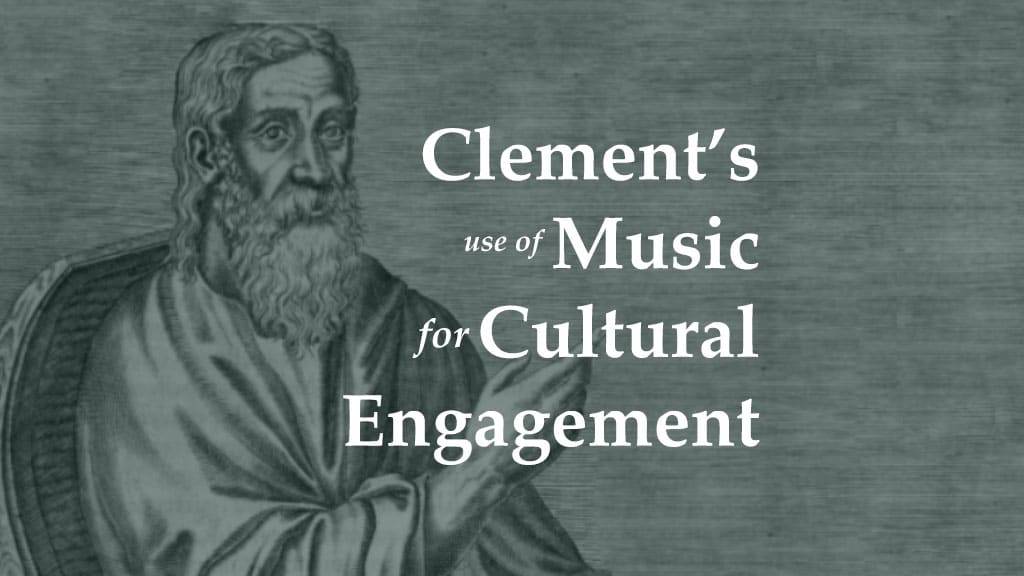The early church fathers are often seen as hard-nosed killjoys when it comes to music. While it is true that the earliest Christians held a stringent view of music resulting in a restricted form of church music, some of the fathers, such as Clement of Alexandria (c.150–215), saw music as a worthy pursuit for the Christian. It is not an exaggeration to say that Clement’s writings are gushing forth with references to music and even long passages of music metaphors. A well-known metaphor is his preferred name for Christ, the New Song.[1]
Music was a key area of Greek culture that Clement appropriated in order to collect truth that was in accordance with the Scriptures. Clement’s philosophy of transforming culture through music presented in The Stromata (also called Miscellanies) can be summarized in this way: All of life is sacred, and everything in this life belongs to God, including music. Thus, for the believer, engaging in music for the purposes of glorifying God, relating to neighbor, attaining knowledge, and enjoying life is permissible; but the believer should be careful not to partake in music that leads to fleshly desires. A look at Clement’s view of life as sacred, his advice to collect aids from the Greeks, and his counsel to embrace appropriate music and reject superfluous music will aid in understanding Clement of Alexandria’s use of music to engage and transform culture.
Clement of Alexandria’s View that All of Life Is Sacred
One important aspect of Clement’s philosophy of transforming culture through the art of music is his view of the sacredness of all of life. For Clement, the “whole life is a holy festival.”[2] This approach leads Clement to find purpose in things that are considered by many to be non-spiritual: “we cultivate our fields, praising; we sail the sea, hymning; in all the rest of our conversation we conduct ourselves according to rule.”[3] This musical reference to “hymning” while sailing at sea may be a literal reference like Tatian’s reference to the chaste, Christian maidens who “at their distaffs sing of divine things.”[4] This musical reference may also be a metaphor for the song that is sounded when a life is controlled by the New Song.
Whether this reference to “hymning” is literal or metaphoric, Clement viewed music as a noble thing to be used as a means of giving glory to God. He equates the work of the sanctifying work of the Spirit with music: “Having tuned by the Holy Spirit the universe, and especially man—who, composed of body and soul, is a universe in miniature—makes melody to God on this instrument of many tones.” When the Spirit’s work is accomplished in the life of a believer, it is the tune[5] of the New Song emanating through his life.[6]
Clement of Alexandria’s Advice to Collect Teaching Aids from the Greeks
Another aspect of Clement’s philosophy is his use of music for the purpose of relating to the Greeks. In a chapter of the Stromata entitled, “The Mystical Meanings in the Proportions of Numbers, Geometrical Ratios, and Music,” he tells believers to collect what is useful for the advantage of the catechumens, and especially when they are Greeks (and the earth is the Lord’s, and the fulness thereof), must not abstain from erudition, like irrational animals; but he must collect as many aids as possible for his hearers. But he must by no means linger over these studies, except solely for the advantage accruing from them, so that, on grasping and obtaining this, he may be able to take his departure home to the true philosophy.[7]
As long as the believer maintains his focus while collecting from the great amount of knowledge available to him, then this endeavor for more knowledge is a good endeavor. This endeavor is especially worthwhile if it results in the collection of learning aids for catechumens. Clement’s commendation of pursuing Greek thought appears to be backed by the understanding that this knowledge was not original to the Greeks. Quoting the psalmist in saying “the earth is the Lord’s, and the fulness thereof” indicates that Clement would have agreed with Augustine (354–430), who two centuries later proposed that all truth is God’s truth when he said, “Nay, but let every good and true Christian understand that wherever truth may be found, it belongs to his Master.”[8]
What is learned among the Greeks should be taken “home to the true philosophy.” [9] This seems to be a reference to God’s truth that is found in Christ and the Scriptures as later Clement refers to “true philosophy, on whom the Scripture enjoins examination and investigation.”[10] According to Clement, the Christian is free to cull truth among Greek philosophy in light of Scripture which is “a strong cable for the soul, providing security from everything.”
Clement of Alexandria’s Counsel to Embrace Appropriate Music and Reject Superfluous Music
After this commendation of seeking knowledge, Clement continues with a word about the proper use of music, astronomy, and philosophy. For the purposes of this study, only his portion on music will be examined.
Music is then to be handled for the sake of the embellishment and composure of manners. For instance, at a banquet we pledge each other while the music is playing, soothing by song the eagerness of our desires, and glorifying God for the copious gift of human enjoyments and for His perpetual supply of the food necessary for the growth of the body and of the soul. But we must reject superfluous music, which enervates men’s souls, and leads to variety—now mournful, and then licentious and voluptuous, and then frenzied and frantic.[11]
He suggests that music has a place in the life of the believer while acknowledging its capacity for good and evil. The place of music commended here is the use of music for personal enjoyment and personal therapy. Just as one should seek knowledge while running back “home to the true philosophy,”[12] so should the believer seek out the best music that aids in “glorifying God for the copious gift of human enjoyments” while rejecting “superfluous music which enervates men’s souls.”[13] Clement provides a fitting illustration for this way of choosing the best: “The kingdom of heaven is like a man who cast a net into the sea, and out of the multitude of the fishes caught, makes a selection of the better ones (Matthew 13:47, 48).”[14]
Conclusion
Clement’s philosophy of transforming culture through the art of music can be summarized in this way: All of life is sacred, and everything in this life belongs to God, including music. Thus, for the believer, engaging in music for the purposes of glorifying God, relating to neighbor, attaining knowledge, and enjoying life is permissible; but the believer should be careful not to partake in music that leads to fleshly desires.
[1] Clement of Alexandria, “Exhortation to the Heathen,” in Fathers of the Second Century, ed. Alexander Roberts, James Donaldson, and A. Cleveland Coxe, vol. 2, The Ante-Nicene Fathers (Buffalo: The Christian Literature Company, 1885), 172.
[2] Clement of Alexandria, “The Stromata, or Miscellanies,” in Fathers of the Second Century, ed. Alexander Roberts, James Donaldson, and A. Cleveland Coxe, vol. 2, The Ante-Nicene Fathers (Buffalo: The Christian Literature Company, 1885), 537.
[3] Clement of Alexandria, “The Stromata, or Miscellanies,” 533.
[4] Tatian, “Address of Tatian to the Greeks,” 79.
[5] The line “tune my heart to sing thy praise” in “Come Thou Fount” concisely explores this concept.
[6] Clement of Alexandria, “Exhortation to the Heathen,” 172.
[7] Clement of Alexandria, “The Stromata, or Miscellanies,” 500.
[8] Augustine of Hippo, “On Christian Doctrine,” in The Works of Aurelius Augustine, Bishop of Hippo: A New Translation, ed. Marcus Dods (Edinburgh: T. & T. Clark, George Street, 1892), 55.
[9] Clement of Alexandria, “The Stromata, or Miscellanies,” 500.
[10] Clement of Alexandria, “The Stromata, or Miscellanies,” 558.
[11] Clement of Alexandria, “The Stromata, or Miscellanies,” 500–501.
[12] Clement of Alexandria, “The Stromata, or Miscellanies,” 500.
[13] Clement of Alexandria, “The Stromata, or Miscellanies,” 501.
[14] Clement of Alexandria, “The Stromata, or Miscellanies,” 502.







